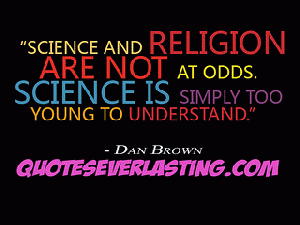
.Science and religion are not at odds. Science is simply too young to understand.. -Dan Brown
(Image by QuotesEverlasting) Details DMCA
.Science and religion are not at odds. Science is simply too young to understand.. -Dan Brown by QuotesEverlasting
From John Caputo's book, What Would Jesus Deconstruct, "Meister Eckhart, said God is unnameable and therefore omninameable, and so He prays, I pray God to rid me of God. I pray (the unnameable) God to rid me of (the idol I have named) God."
He goes on to say, "Orthodoxy is idolatry if it means holding "correct opinions about God" -- "fundamentalism" is the most extreme and salient example of such idolatry, but not if it means holding faith in the right way, that is, not holding it at all but being held by God, in love and service."
Before you object to the term, "by God, in love and service," and dismiss this whole piece because you don't believe God exists, please indulge me a bit longer.
In a nutshell, Mr. Caputo's comments go directly to the heart of the religious crisis in America today. The crisis? With regard to religion, the largest growing cohort are the "none's". I.e., the people who don't subscribe to any religion. For further evidence for this claim of crisis, read the reader comments on articles related to religion on just about any popular website or blog.
Religion is regularly criticized, condemned, and blamed for atrocities going back to the Crusades, Inquisition and Witch Trials up through current forms of terrorism driven by the fundamentalist fervor of Muslim jihadists. Believers are called every pejorative term ever invented. Many times, rightfully so, given the superficial level of faith that Caputo often refers to as that practiced in postmodern times.
But what has happened to religion in postmodern times that warrants the kinds of criticism it gets? I've written about the difference between faith in our beliefs and faith in the unknowable as a way to delineate the level of superficiality that seems to define postmodern religion. That is, the heavy focus on following the orthodoxy of a belief system without questioning its bases. Deconstruction is about this very point.
My fear is that we throw the baby out with the bathwater if we condemn and dismiss religion out of hand. When we reject the existence of God, in the process we run the risk of rejecting the essence of what the concept of God represents to humanity. I repeat, not the orthodoxy, but the essence. I understand the rejection of the orthodoxy.
Valerie Tarico, articulated reasons quite well in her article on Alternet.org titled, "The 20 Weirdest Religious Beliefs. Here's a few: " The foreskin of [a holy one] may lie safeguarded in reliquaries made of gold and crystal and inlayed with gems--or it may have ascended into the heavens all by itself." "Brown skin is a punishment for disobeying God." "Sacred underwear protects believers from spiritual contamination and, according to some adherents, from fire and speeding bullets." "When certain rites are performed beforehand, bread turns into human flesh after it is chewed and swallowed." "Invisible supernatural beings reveal themselves in mundane objects like oozing paint or cooking food."
But we see these beliefs in isolation, standing aside, so to speak, of the whole system of which they are a part. Systems that have evolved over centuries of reinterpretations and reiterations. They are human attempts to understand and explain to other humans, the essence of the concept we call God. Humans who were ignorant of the science we have at our fingertips today. Humans who were born into and nurtured in the systems that contain what we can see as ridiculous from an outside point of view.
To understand the truth of a proposition, we must travel the steps of those who preceded us in creating the meanings upon meanings heaped on it from the beginning.
There is a place, indeed a need, for religion today, with or without a God or god. Because failing as it may be today, we need it to tie us back, not to an earlier time as its definition implies, but to remind us of the original truths contained therein.
With the exception of natural disasters, there is an undeniable element of truth in the logic of God's judgments behind many of our tragedies. The claims that many of us love to ridicule. I don't claim there is an intelligent agent named God judging us. I claim it's often the consequences of our own folly. A folly that might have been prevented with an appreciation for what the concept of God represents -- the highest level of human morality.
Robert De Filippis





